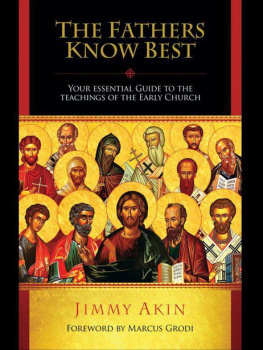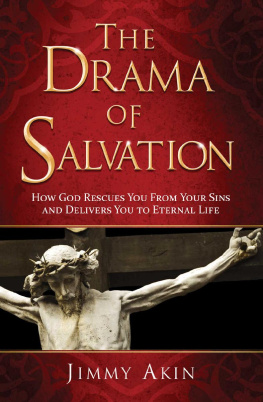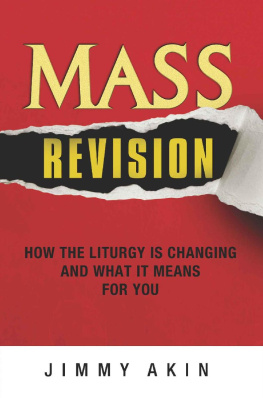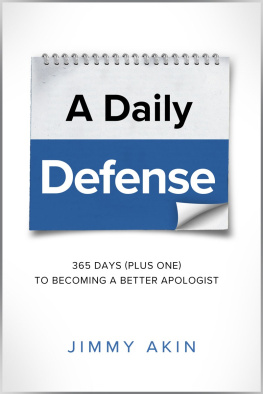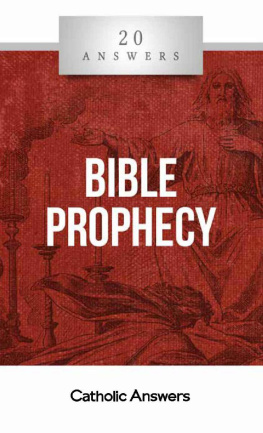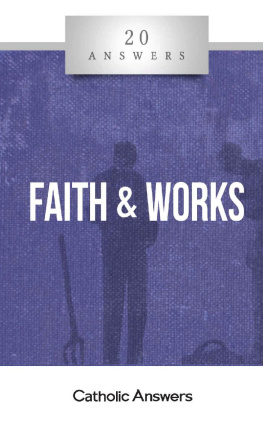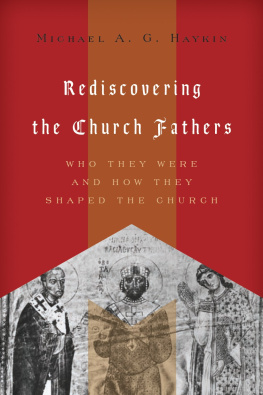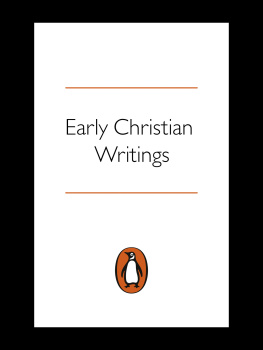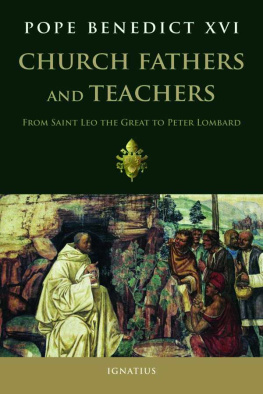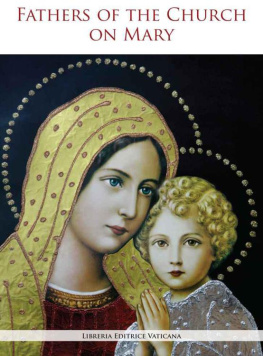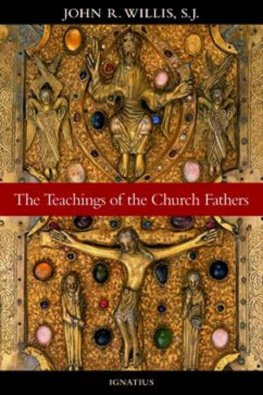THE FATHERS KNOW BEST
Your Essential Guide to the
Teachings of the Early Church
Jimmy Akin

SAN DIEGO
2010
NIHIL OBSTAT: I have concluded that the materials presented in this work are free of doctrinal or moral errors.
Bernadeane M. Carr, STL
5 October, 2010
IMPRIMATUR: In accord with 1983 CIC 3, permission to publish this work is hereby granted.
+ Robert H. Brom, Bishop of San Diego
5 October, 2010
With the exception of quotes from the Church Fathers, all Scripture selections are taken from the Catholic Edition of the Revised Standard Version of the Bible , copyright 1965, 1966 by the Division of Christian Education of the National Council of the Churches of Christ in the United States of America. Used by permission. All rights reserved. If any copyrighted materials have been inadvertently used in this work without proper credit being given in one manner or another, please notify the publisher in writing so that future printings of this work may be corrected accordingly.
2010 Catholic Answers, Inc. All rights reserved. Except for quotations, no part of this book may be reproduced or transmitted in any form or by any means, electronic or mechanical, including photocopying, recording, uploading to the Internet, or by any information storage and retrieval system, without written permission from Catholic Answers, Inc.
Published by Catholic Answers, Inc.
2020 Gillespie Way
El Cajon, California 92020
(888) 291-8000 (orders)
(619) 387-0042 (fax)
www.catholic.com (web)
Cover design by Devin Schadt
Typesetting by Loyola Book Composition
Printed in the United States of America
ISBN 978-1-93-391954-6
Contents
PART ONE
PART TWO
Foreword
For the first forty years of my life, it never crossed my mind that I needed anything else but the Bible to know what I needed to believe to be a faithful Christian. When I was in seminary and preparing to become a Protestant pastor I studied the history of Christianity, but with a certain slant that skirted any acknowledgment of the historical importance of the Catholic Church. For me, as well as most of my fellow seminarians, the important history essentially ended with the closure of the New Testament and picked up again with the sixteenth century Protestant reformation.
I certainly knew of some significant Christian figures and events from those lost fifteen hundred years, but for me and the congregations I pastored, all that was important was the Biblewhich had been saved from the clutches of the Whore of Babylon through the courage of the Reformers. The few references I had read from the writings of the early Christian writers (I dont remember referring to them as early Church Fathers) were selectively chosen to demonstrate that the early Church was more like Protestantism than Catholicism.
Then, by Gods grace, my eyes were opened to the problems of Protestantism. Without question, it was my discovery of the witness of the early Church Fathers that most opened my heart and mind toward the Catholic faith. Fortunately, God provided helpers to assist me in finding and working my way through the few available collections of the Fathers, most of which were out of print and some badly skewed by anti-Catholic translators. Through their witness, the Catholicism of the early Church became so obvious that my family and I knew that if we were to follow the truth then we had no option but to become Catholic.
After his Resurrection, Jesus gave his Apostles what has traditionally been called the Great Commission: Go therefore and make disciples of all nations, baptizing them in the name of the Father and of the Son and of the Holy Spirit, teaching them to observe all that I have commanded you (Mt 28:1920). What they taught was the Gospel. This Gospel, however, included far more than the minimalist outline of Christs saving sacrifice on the Cross preached by so many modern Christian evangelists. It also included far more than what can be gleaned from the New Testament Gospels and Epistles, which themselves allude to this wider apostolic teaching.
In Second Thessalonians 2:15, Saint Paul exhorted his Christian brethren to stand firm and hold to the traditions which you were taught by us, either by word of mouth or by letter. To the Corinthian Christians, he wrote, maintain the traditions even as I have delivered them to you (1 Cor 11:2). Saint Pauls preferred means of passing along the full Gospel was not in letter form, but in person by word of mouth. He would only write if he couldnt be there in person, as we find in his comment to his true child in the faith, Timothy: I hope to come to you soon, but I am writing these instructions to you so that, if I am delayed, you may know how one ought to behave in the household of God, which is the Church of the living God, the pillar and bulwark of the truth (1 Tm 3:1415).
The full Gospelthe Apostolic Tradition or deposit of faithincluded all aspects of how one ought to behave in... the Church, which included, therefore, church order, structure, discipline, and liturgy, as well as the growing theological questions. And this deposit of faith was to be passed on just as it had been received: What you have heard from me before many witnesses entrust to faithful men who will be able to teach others also (2 Tm 2:2).
This passage has many implications, but it particularly highlights that the new theology of sola scriptura that arose fifteen hundred years later in the cauldron of the Protestant Reformation truncated the fullness of the Gospel by limiting it to the written Word. Sola scriptura certainly does not describe how Christian truth was transmitted or defined in the early days of the Church, and it is the discovery of this factas well as so many other fallacies associated with the doctrine of sola scriptura that has opened the hearts of so many Protestants to consider the fullness and beauty of the Catholic faith.
A large majority of Christians today believe that all one needs to know about the early Church can be gleaned from the book of Acts, and that beyond that, the essence of early Church structure, liturgy, and praxis is somehow a prototype of what they experience in their modern-day Protestant churches. But if the inspired words of the New Testament do not contain all that the Apostles taught the early Christians, then how does one discover the rest of what these early Christians believed? The answer to thisat least for hundreds of modern Protestant ministers who have surprisingly found their way home to the Catholic Churchis in the writings of the early Church Fathers.
During the first centuries of the Church, there were hundreds of other writings besides those which the Church later determined were to be included in the inspired canon of Sacred Scripture (see chapter 22). Some of these writers were converts and disciples of the Apostles, thereby receiving the Apostolic Tradition directly, like a racers baton passed from Jesus to his Apostles to them. Others were the converts and disciples of these earlier converts, and on and on, fulfilling Saint Pauls instructions to Timothy. The bishops of the Church declared that these writings were not to be included in the Canon, yet they recognized the value and authenticity of these faithful Christian writers by declaring them Fathers of the Church. In their writings, we hear how the teachings of Jesus and his Apostles spread through evangelization to shape lives, cultureseven civilizations.
How, though, can we access such a large corpus of writings, especially when they were written in languages that most of us today have not had the patience to learn? For this, we are particularly blessed by this release of Jimmy Akins superbly compiled synopsis of the writings of the early Church Fathers. There are other collections, which have helped many discover the beauty and importance of what these early writers reveal about the expanding and persecuted early Church. But Akins finely selected and categorized collection provides a far more accessible introduction into the full Catholicity of the early Christians. As a convert himself and a well-honed apologist, Jimmy knows the topics that are most crucial for those wanting and needing to know what the early Church believedespecially in those doctrinal areas where Catholics and non-Catholics bump heads.

